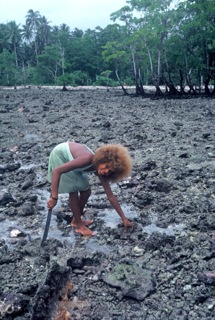Conclusion: Grassroots Reef Conservation
The alata system has embodied a nexus of technological-social-religious-economic-political power relationships. With civilization in the modern independent nation, Lau culture and its alata system are losing custom interrelationships. Cash net-fishing for the ice chest is making the alata ineffectual at conserving resources.
Meanwhile, gill-netting by individuals with their own inexpensive small-meshed nylon nets is spreading around the Passage. Fanalei fishermen eagerly set these little gill-nets, following the interest of Fanalei's national elite in bringing more cash into the village by promoting net-fishing. This destructive new fishery, however, falls outside the realm of the alata system.
 Fanalei's chiefly clan's, owning the alata and land with giant trees, has national elite members lending them access to cash and credit unlike the other clans. They aim to reduce the risk of the other clans' jealousy. So they have acted to share their custom resources and some power gained from “feeding the people.”
Fanalei's chiefly clan's, owning the alata and land with giant trees, has national elite members lending them access to cash and credit unlike the other clans. They aim to reduce the risk of the other clans' jealousy. So they have acted to share their custom resources and some power gained from “feeding the people.”
Because their clan plan for intensive cash net-fishing inside alata is not turning out to be viable, they still have the custom option to revive the adi for net-fishing--in parallel to the adi for foraging shells--and place alata net-fishing back under grassroots control. Unfortunately, escalating individual gill-netting is beyond the custom reach of the alata system. This might limit the potential effectiveness for saving Passage reef stocks of reintroducing adi for alata net-fishing.
Reefs all around the Passage are being depleted, population is rising, and saltwater-bush fishing conflicts are escalating. But Fanalei acting as a village under the chief as with the Village Fund--instead of granting largess in the name of the chiefly clan--could possibly reinvent the use of adi throughout the Passage. Fanalei might incorporate net-fishing bans on all European robber nets, large and small, group-run and individually owned, inside and outside the alata. This will call for some creatively custom ways of incorporating and controlling the Lau of Walande and the rising population of ever more aggressive Sa'a bush fishermen.
Sustainable village cash fisheries using adi would have to center around a new local control of the Passage. Success will need the buy-in of all Lau village clans in decisions for conservation bans then sharing the harvests. Passage-wide adi can gain cooperation and compliance if all clans believe that the adi fisheries will benefit their social political economic well-being. Ramo dominance and intimidation is over.
Note that management as a concept and construct of Fisheries in the Solomons has been top-down, without enforcement of regulations like mesh-size, relying on economic solutions to curb reef fishing for cash, as in Fanalei. So far there has been no effort at incorporating local beliefs and social organization.
Outside scholars and resource managers classically hold romanticized notions about “traditional” people and their conservation practices. Many have assumed that local “custom” fishers will manage their resources for long-term sustainability if left to their own devices practicing some folk system of management, without cash markets to lure them into overfishing.
Critical questions in untangling these assumptions need deep ethnographic understanding. First we recognize that a custom tenure system is not locally conceived of as management with the concomitant biological concepts of cause and effect from overfishing. Then we search for ways to encourage locals to work within their accepted custom system. The alata system is as an, albeit unconscious, management system that can still control access to local reef resources, and might even be expanded to ensure reef recuperation. Whether or not islands share national managers’ biological concept of intensive reef fishing causing overexploitation--biological cause and effect—may not be imperative for successful management. Fanalei islanders hold other concepts for reef fecundity in a world that holds spirits and rivalries to account. What matters is how to encourage local hierarchies to use their own custom reef control systems to organize and share grassroots conservation and its profits.









